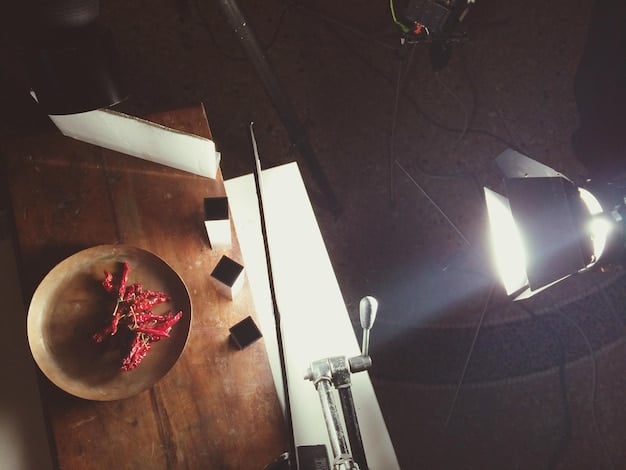Film Industry Copyright Lawsuit: Will Movie Making Change?

The film industry is facing a new copyright lawsuit that could potentially reshape how movies are made, impacting creative processes, legal boundaries, and financial structures within Hollywood.
The film industry is no stranger to legal battles, but a new film industry faces new copyright lawsuit is sending ripples through Hollywood. The lawsuit, details of which are still unfolding, has the potential to dramatically alter the landscape of filmmaking. Could this be the beginning of a new era in how movies are conceptualized, produced, and distributed?
Film Industry Faces New Copyright Lawsuit: An Overview
Copyright law is the backbone of the entertainment industry, protecting the rights of creators and ensuring they are compensated for their work. However, copyright disputes are common, often leading to protracted legal battles that can impact careers and companies. This new lawsuit brings fresh scrutiny to the existing legal frameworks and their applicability in the modern film industry.
This lawsuit emerges at a time when the industry is already grappling with numerous disruptions, from streaming services to AI-generated content. The outcome could set new precedents, affect future productions, and even change the way studios approach creative projects.

The Core of the Dispute
Understanding the specifics of the lawsuit is crucial. While details are still emerging, the core of the dispute typically revolves around allegations of copyright infringement. These can range from unauthorized use of literary works to disputes over music, characters, or even plot elements. The plaintiff in this case claims that certain aspects of a recent blockbuster movie are substantially similar to their own copyrighted material.
What Constitutes Copyright Infringement?
Copyright infringement occurs when someone uses copyrighted material without permission. To prove infringement, the plaintiff must demonstrate two key elements: ownership of a valid copyright and evidence that the defendant copied the protected work.
The ‘Substantial Similarity’ Test
A critical aspect of copyright law is the “substantial similarity” test, which determines whether the alleged infringing work is similar enough to the original to constitute a violation. Courts often look at the overall look and feel of the works, considering elements like plot, characters, theme, dialogue, mood, setting, pace, and sequence.
- Ownership of a valid copyright is paramount.
- Evidence of copying, direct or indirect, must be presented.
- The “substantial similarity” test evaluates the degree of similarity.
- Expert testimony often plays a crucial role in these cases.
The resolution of this lawsuit will hinge on these principles, requiring careful analysis of both the original material and the allegedly infringing work.
Potential Ramifications for Movie Making
The implications of this lawsuit go far beyond one film. If the plaintiff prevails, it could lead to stricter scrutiny of creative works, potentially making studios more cautious about the types of stories they greenlight. This could result in a chilling effect on originality and innovation as filmmakers try to avoid even the appearance of infringement.
Conversely, a victory for the defendant could reaffirm existing creative freedoms, providing clarity on what constitutes fair use and derivative works. However, it might also embolden studios to take more risks with copyrighted material, potentially leading to further legal challenges down the line.
The Impact on Scriptwriting and Story Development
Scriptwriting is a cornerstone of filmmaking, and copyright law plays a significant role in this area. Writers often draw inspiration from existing works, but they must be careful not to cross the line into infringement. A ruling that favors the plaintiff could lead to more conservative storytelling, with writers being hesitant to explore complex or controversial themes.
The Role of Legal Review
Studios may increase their reliance on legal review during the scriptwriting process, potentially adding layers of bureaucracy and slowing down production timelines. Legal teams would be tasked with identifying potential copyright issues, ensuring that scripts are thoroughly vetted before filming begins.
Originality vs Inspiration
One of the central challenges will be striking a balance between originality and inspiration. Filmmakers often pay homage to classic films or incorporate familiar tropes, but they must do so in a way that doesn’t infringe on existing copyrights. Navigating this delicate balance will require careful consideration of legal and creative factors.
- Scriptwriting may become more cautious and conservative.
- Legal review processes could become more stringent.
- Balancing originality and inspiration will be a key concern.
- The cost of legal insurance may increase for filmmakers.
The outcome of the lawsuit could redefine the boundaries of acceptable creative practice, influencing how stories are developed and brought to the screen.
Financial Implications for the Film Industry
Copyright lawsuits can have significant financial repercussions for the film industry. Legal fees, potential damages, and the cost of delaying or halting production can quickly add up, impacting a film’s profitability and a studio’s bottom line. Moreover, the uncertainty surrounding copyright law can affect investor confidence and the availability of financing for new projects.
Insurance and Risk Mitigation
Studios often rely on insurance policies to protect against copyright claims, but the cost of this insurance could increase if the legal landscape becomes more uncertain. Risk mitigation strategies, such as thorough copyright searches and legal reviews, may also become more common, adding to the overall cost of production.
The Impact on Independent Filmmakers
Independent filmmakers, who often operate with limited budgets, are particularly vulnerable to copyright lawsuits. Even a frivolous claim can be financially devastating, potentially forcing them to abandon their projects or settle out of court. This can stifle creativity and limit the diversity of voices in the industry.
The financial stakes in copyright cases are high, with millions of dollars often on the line. The outcome of this lawsuit could influence the risk assessment strategies of studios and investors, shaping the financial dynamics of the film industry.
How Streaming Services Could Respond
Streaming services have revolutionized the way movies are consumed, but they also face unique copyright challenges. These platforms are responsible for ensuring that the content they stream is legally obtained and does not infringe on the rights of others. A stricter copyright environment could force streaming services to become more vigilant about the content they offer, potentially removing films or TV shows that are subject to copyright disputes.
Licensing and Content Acquisition
Streaming services may need to reassess their licensing agreements and content acquisition strategies, demanding more robust assurances from content providers that their works are original and do not infringe on existing copyrights. This could lead to longer negotiation periods and increased costs for licensing content.
Algorithms and Copyright Detection
Some streaming services are already using algorithms to detect potential copyright infringements in user-generated content, but these technologies could be expanded to screen entire films or TV shows for similarities to copyrighted material. While these algorithms are not foolproof, they can provide an additional layer of protection against copyright claims.
- Streaming services may become more cautious about content acquisition.
- Licensing agreements could become more stringent.
- Algorithms for copyright detection may become more prevalent.
- The availability of certain films on streaming platforms could be affected.
The relationship between streaming services and copyright law is evolving, and the outcome of this lawsuit could accelerate the adoption of new technologies and strategies for managing copyright risk.
A Global Perspective on Copyright Law
Copyright law varies from country to country, creating a complex web of legal standards and enforcement mechanisms. International film productions must navigate these differences, ensuring that their works comply with the laws of each jurisdiction where they are distributed. A landmark ruling in the US could influence copyright law in other countries, potentially leading to a more harmonized global standard.
Treaties and Agreements
International treaties and agreements, such as the Berne Convention for the Protection of Literary and Artistic Works, provide a framework for cross-border copyright protection. However, these treaties often leave room for interpretation, leading to disputes over the scope and enforceability of copyright law.
The Role of International Courts
International courts and arbitration bodies can play a role in resolving copyright disputes that span multiple countries. These forums offer a neutral ground for parties to present their cases and seek redress for alleged infringements.
The global dimensions of copyright law add another layer of complexity to the film industry. Filmmakers must be aware of the legal standards in each country where their works are distributed, and they may need to seek legal advice in multiple jurisdictions to protect their rights.
| Key Point | Brief Description |
|---|---|
| ⚖️ Lawsuit Core | Allegations of copyright infringement over a blockbuster’s elements. |
| 🎬 Movie Impact | Potential changes in how stories are developed and reviewed. |
| 💰 Financial Risks | Increased insurance costs and financial strains for independent filmmakers. |
| 🌐 Global Copyright | Need for international productions to navigate different copyright laws. |
Frequently Asked Questions
▼
Copyright infringement occurs when someone uses copyrighted material without permission from the copyright holder, violating their exclusive rights.
▼
The ‘substantial similarity’ test is used by courts to determine if an allegedly infringing work is similar enough to the original to constitute infringement.
▼
The lawsuit may lead to more conservative storytelling, with writers being more cautious about exploring complex or controversial themes to avoid infringement.
▼
Independent filmmakers are particularly vulnerable to copyright lawsuits, as even a frivolous claim can be financially devastating and force them to abandon projects.
▼
Streaming services often use algorithms to detect potential copyright infringements and may reassess licensing agreements to ensure content is legally obtained and does not infringe rights.
Conclusion
The film industry faces new copyright lawsuit is a watershed moment that could reshape the creative and financial dynamics of Hollywood. As the legal proceedings unfold, filmmakers, studios, and streaming services will be closely watching, adapting their strategies to navigate this evolving legal landscape.





